Suzi Coombs – Visual Artist
Suzi is also a fashion photography model and bass player in punk band, Overbite. She recently formed the in/Form Art Collective and opened Studio9 studio space in Tuam, along with Gianna Tomasso.
More from...
Can you tell us about your background?
I'm from Galway - born and bred in Newcastle. I've always lived here. I decided to go to college here as well, which is kind of unusual I guess, but my boyfriend was in art college as well and we just decided to stick together and go to GMIT. It actually paid off really well, because I ended up meeting loads of people in Galway who would have seen me around all the time. I think that helps when you go to openings and that type of thing.
How did you get involved in the arts?
I thought originally I wanted to be a writer and an awful lot of my earlier work was based all around language - it still focuses on language a lot, but I did the portfolio course at GTI and I just thought, there's something in this; I've got to see it through, go to college, get a degree in it, see if it works out for me. So I did the Degree in Fine Art and Sculpture in GMIT.
How would you describe yourself?
I'm not used to talking about myself. I'm not a very ego driven person so it's hard for me to reflect on why I'm doing something. I suppose I'm a hard worker. I'm driven. I think it's just a primal drive - I need to do these things to feel satisfied with my life. I couldn't ever sit at a desk doing repetitive work every day. In my experience, creative people just have this drive; they need to do it, they get upset when they're not producing things. It's not a therapeutic thing, necessarily. It's just what you do.
"I wanted my work to create a platform for young people and make them feel empowered, I suppose make myself feel empowered too."
What drives you to achieve all these things?
I just really like being productive. I like looking back and saying, 'That time, I did this'. It's kind of hard to describe. I'm just searching for that eureka moment when I go, 'Yeah, I'm happy with this'. I really want it to be a revolving practice that keeps getting better. I like reading, I like researching too, so there's a constant rollover of thought. It can be incredibly frustrating as well, because it can be all consuming. And I'm a perfectionist. If I see something in my head and I want it to be a certain way, if it's not that way, I will do it until it is. All of the things that I do are kind of precarious - I make music, I model, and I make art. You just have to keep moving with them all the time and try your best to keep going with them and produce as much as you can, so that you eventually get to a level where you're happy with it.
Innately, you must be that type of a person…
Yeah, I love to be busy, so I find it very frustrating when I'm not producing things. No matter what it is, I have to be producing and doing something all the time. I found it a big drop off after college actually because it's so busy and intense and then all of a sudden there's nothing and you're a little bit adrift. But people have been throwing opportunities at me and I've made myself visible, and people pick up on that.
For you as a young artist, what is your perception of the type of artistic environment in Ireland and The West of Ireland in particular. Does it hold out much hope for you?
That's quite difficult to answer, because I'm so new into it but I have been working in galleries for about five years now so I do have a bit of an impression. There's just no infrastructure for young artists coming out. There are a few things that you can do but once you have those things done, there's very little room for you to expand your career, to keep going. But I think I've based myself quite firmly in Ireland and around Irish issues so for me, it wouldn't make sense to leave straight away. In general, the people in the arts scene are amazing; they're really welcoming and you get so many opportunities from people, just from meeting them once. People are very kind and they will do a lot for a graduate, but there's only so much they can do too because there's just no ladder. It's almost as if everyone is fighting over a small pool jobs and there's not much progression.
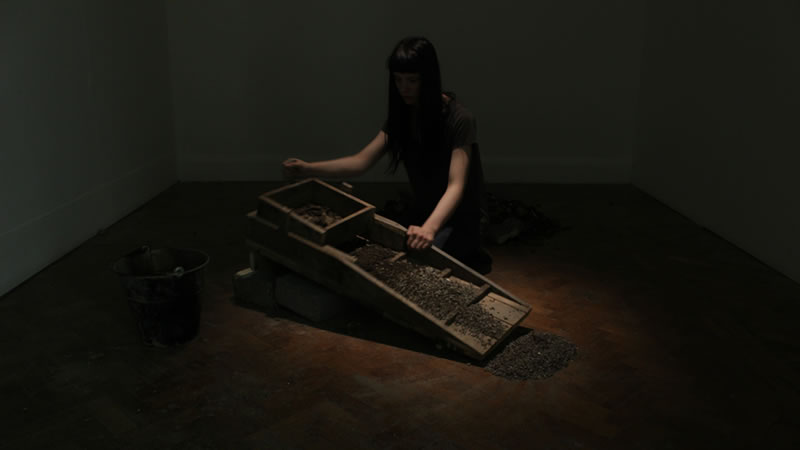
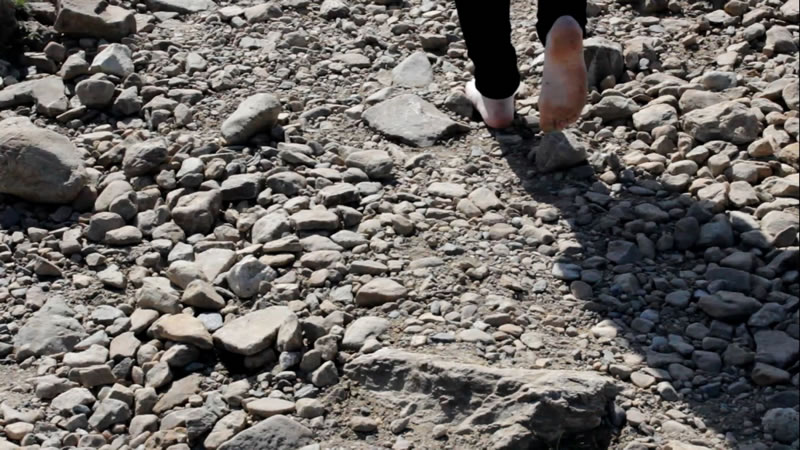
Can you describe your most recent work?
My most recent body of work is a continuation of the work from my degree show. It all stemmed from the dole cuts for Under 26's. Most of this work has been performative so far. I began by collecting information – taking surveys of Under 26's outside the dole office and in college. I collected over 100 and that work is still ongoing. I wanted to play with the notion of a search for gold with that of a search for happiness and a future. I did a number of gestural performances based around Croagh Patrick – the mountain contains a €360 million deposit of gold but was never mined due to pressure from the local community. I found their mobilisation very inspiring and I thought I'd use it as an exemplar. I wanted my work to create a platform for young people and make them feel empowered, I suppose make myself feel empowered too. The feedback I got from the surveys was that of general apathy. I found most of the young people who took part were frustrated and most saw emigrating as the only way out.
The work was titled "Finding Irish Gold: How to Dig Your Way Out of Austerity". It's ended up manifesting itself in many different ways so far. For my degree show, I really wanted to use the mountain as a symbol of the overwhelming debt and pressure young people were facing, that's why I decided to stamp out a mountain of debt over the week of the show. I had done some other performance but it was all still a learning curve. Doing a performance every day made me realise where things could get really interesting and how I had to leave myself open to that. On the last day, I had finished the drawing. I really liked the way it looked, so I just kind of walked into the audience and started stamping myself instead. So things like that happen. They're almost unconscious things that I hadn't planned at all. It's an interesting process and I'm still working with it.
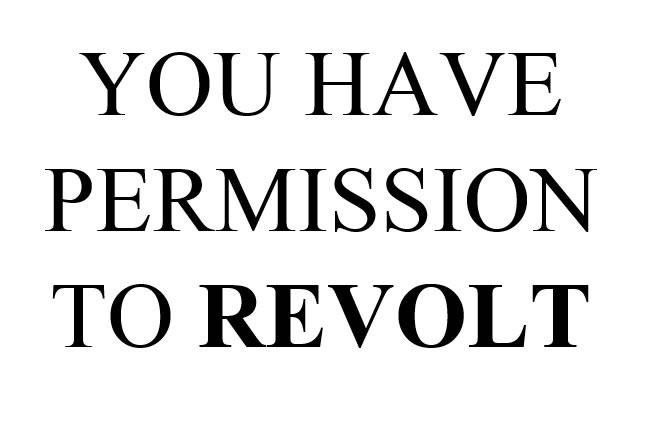
So what's going on for you at the moment?
I've recently formed in/Form Art Collective with Gianna Tomasso who I met in college. It's made the transition from college a bit easier having someone to work with and talk to. We've got a few projects underway including a show opening in Tullamore on the 10th of September, Foundation15. We've also recently started a studio space in Tuam called Studio9, which is really exciting but a bit scary too. We're self-funded at the moment and just trying to establish ourselves but I think it has a lot of scope and I'm looking forward to seeing where it goes. I'm also trying to build up my own practice and experience, so that's really my main focus right now.
Tell us about your music?
I play bass in a punk band. I know, unusual. It's called Overbite - a stupid name. It's going really well. We're going on tour in October so we're really happy and we're putting out a record in October as well. Our singer is based in Dublin - so we mostly play up there. But we also set up our own shows in Galway from time to time. We formed Solemn Records Collective and started putting out our own music and a few friends' bands too.
How did you get into modelling?
I really fell into it. I didn't plan to become a model. A friend of mine and I, for fun, did a GTI fashion show and a photographer approached me after and said he'd love to do a shoot with me. I was really apprehensive because I thought it would be something else, but it turned out to be quite a creative thing as well, which I don't think people realise. The model has so much to do with image making as well. I did one shoot and that led to another shoot and I just kept going and I decided that I'd try to do it for money. So I joined an agency in Galway but that kind of work was more the glamour side of modelling and I wanted to do something a bit different, so when I found Distinct, the agency I'm currently with, I just thought it was the right fit. I'm not tall enough to be a fashion model but I do a lot of fashion photography modelling, so I found a way into it.
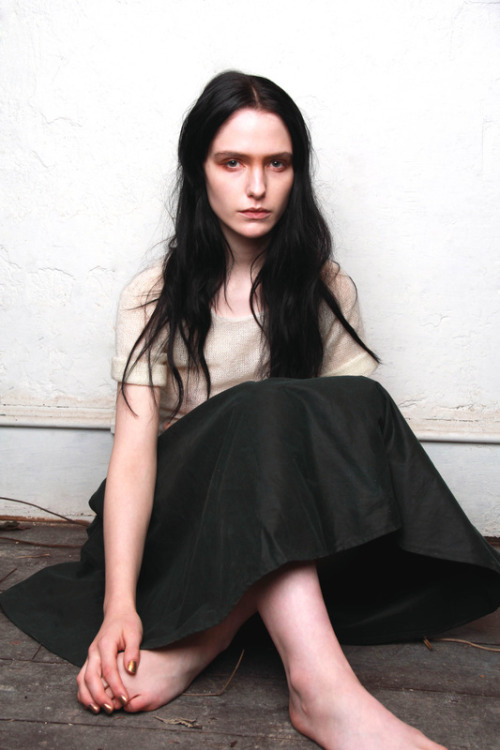
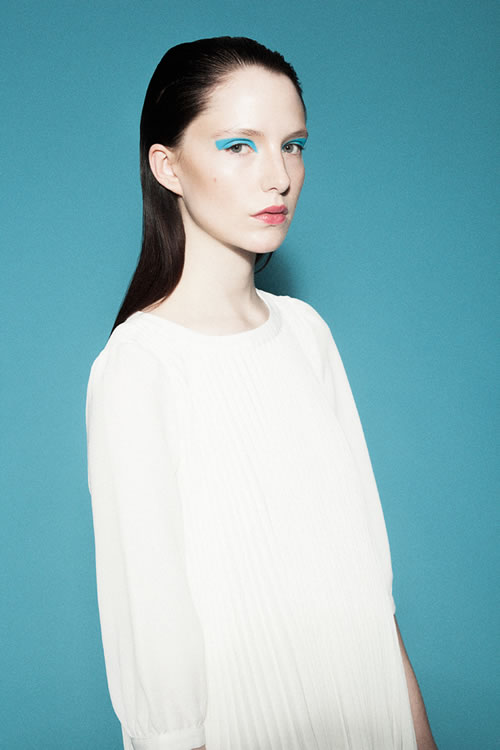
A lot of your shots are creative and edgy. Do you find that it fits in quite well with your artistic work?
It definitely taught me a lot about how to assert your presence and that's very important in performance, about how to be around a camera. I'm very comfortable in front of a camera most of the time, more comfortable in fact than anywhere else, so it just worked out really well and taught me loads about entrepreneurship and handling yourself in that way too, because you have to meet a lot of people and strike up a friendship with them straight away so that you can work together.
How do you divide your time between your art, your music and your modelling work?
It's quite difficult sometimes - when you have so many outlets it can be really draining, so I tend to do them intensively for certain periods. So for this month, I'm going to be doing this, this month I'm going to be doing this. There's crossover all the time, but it's what I try to do. You have to separate them in your head as much as possible. Obviously, they all influence each other massively, but you do have to try to segment them because otherwise, I'd have no time for anything else.
Do you work on instinct or think things through?
I think it's probably a combination of both. When I'm getting an idea, there's a lot of research and mulling things over. I like to let things sit with me for a little while and then I'll go into making mode and there's a lot of instinct involved with that. It's like your creative place almost. It's like when you're making things, there's happy accidents so that's more instinctual. When I'm performing, that's more instinctual.
You seem to be very conscious of the importance of networking and that side of the business?
I did a lot aside from making art in GMIT. I set up a professional practice society with the head of the college at the time, Sarah Searson, which involved getting guest speakers in. I worked really closely with 126 Gallery and Megs Morley on that - she really influenced me a lot with regards who to get and she helped me a lot with contacts. I think people get really caught up in their creative process and they forget that they have to speak to people, work with people and write proposals. Once I became aware of that, it was a real eye opener and I figured I have to start doing this now if I want to be making art work. I have to find a way to facilitate that. I'm by no means a professional yet, but I have a bit more of a grasp than most students had coming out.
"I think people get really caught up in their creative process and they forget that they have to speak to people, work with people and write proposals. Once I became aware of that, it was a real eye opener."
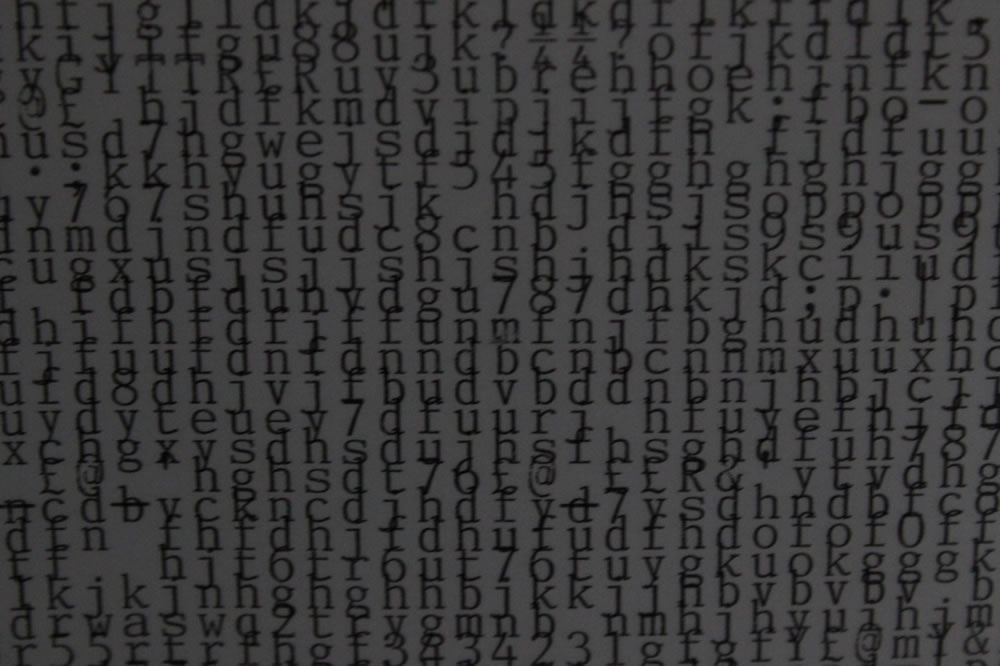
"It's my tendency to go, ‘I'm not happy with this, what can I do to fix it or make it better?"
What about your peers and the fact that they all had the idea they were going to emigrate. Is the feeling completely outward looking, or are there many people going, 'Hey, let's do something really great in Galway'?
I think in my peer group in college, I was the only one inward-looking, because it's my tendency to go, 'I'm not happy with this, what can I do to fix it or make it better?', whereas I think a lot of students just want to walk into something. It definitely gets frustrating because there's only so many galleries you can show in here, there's only so much you can do so you have to be very creative with the way you manipulate that. But I think it's good to travel but always have a base, which is what I do with music, and apply the same principals to art. I'd like to travel, take it as far as it could go, but always come back.
What in your opinion is missing in the artistic infrastructure in Galway?
There's two things - a more permanent fixed place that's safe, like a museum-type space for contemporary art that is run by the right people. There are so many fantastic artists in Galway City and County that are doing really interesting stuff elsewhere, but there's no infrastructure for them here. I think there needs to be more transient stuff happening too - just one off things and for it to be easier for people to do those things, not to meet so many walls. Because I have a lot of interests and I'm constantly looking for spaces to put on DIY shows and performances and things like that and they're just not open to young artists - or to older artists. It would be great to see disused spaces more utilised and more opportunities that are one off. Because that's what makes culture - not just a permanent space where there's a regimented set out programme of events, but also the exciting and strange things that can happen when people are given space to do that.
I think it can be done. I think if people had more the punk ethos in them that they thought, 'We'll just do this, we'll do it whatever way we possibly can, call in all the favours we can'. Galway does somewhat work like that already, but it would be great if young people stuck around and more people did that and there was more energy.
That's what makes culture - not just a permanent space where there's a regimented set out programme of events, but also the exciting and strange things that can happen when people are given space to do that.
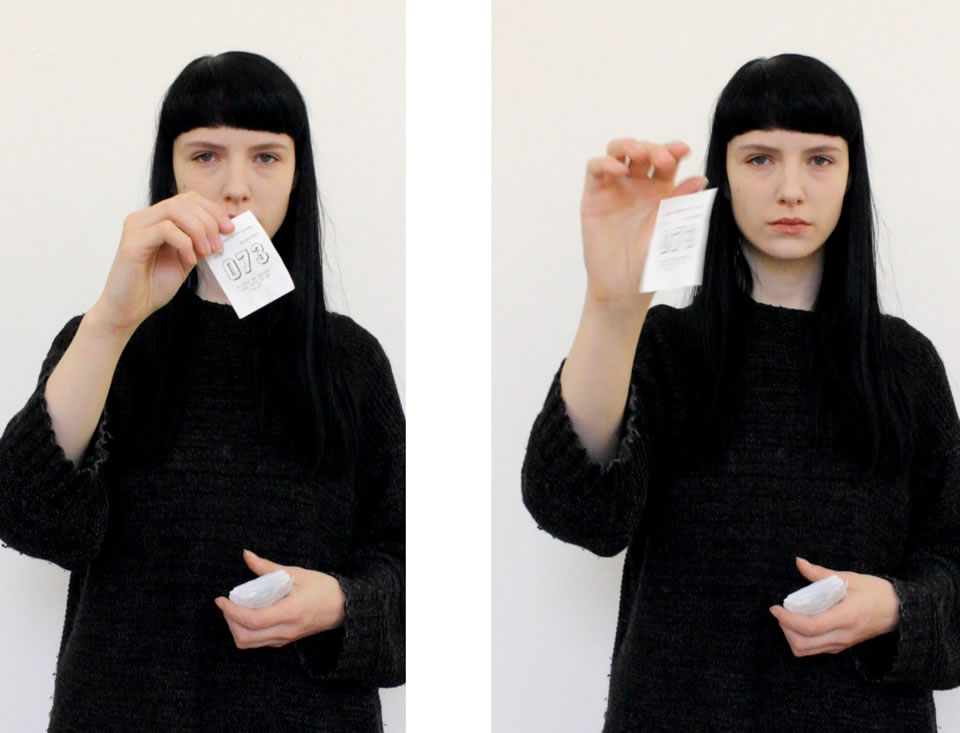
What's your favourite cultural city or place?
I haven't travelled a whole lot yet, but I love Berlin - that's really a whole other level. It's got a vibrancy and an energy. What really struck me was that there's such a good infrastructure - there's young people there who have jobs in galleries. I just thought, wow, that's a whole other thing! The arts are just really well supported over there. That's why it's so well known for culture. And it's really good for punk too.
What's your view on culture and Galway?
Galway doesn't realise how important culture is to its image worldwide. People come from all over the world to see performers here, so it needs to really utilise it and and recognise it and go, 'Ok we're going to support these people, encourage them to stay here and give them an infrastructure where they can actually survive'. The work that I've been doing is very topical within the arts as well, because the dole was cut for the under 26s from €188 to €100, so how could a person possibly survive on €100 per week and volunteer all their time to an organisation? It certainly focused me because at the moment, I am just on the dole and I'm thinking, how can I sustain this? Only for my parents are from Galway and I live here, with them, I wouldn't be able to sustain this at all. I think that's had a lot to do with people leaving or even just going to bigger places - Dublin, Belfast, Glasgow - places like that.
What's your vision for Galway as a cultural utopia?
I think more experimental stuff. I'd love to see more stuff that wasn't so safe and popular. I think Galway is a unique place and it's got something that nowhere else in Ireland has. Not to romanticise it, but while it's a small city but it's big in other ways. It feels like there's so much potential here. I'd love to see that utilised in more experimental ways.
- Fergal McGrath - Previous
- Next - Jess Murphy